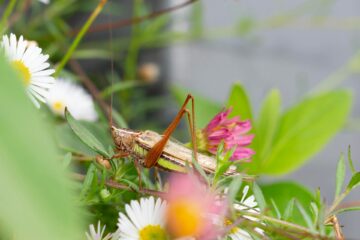Summer is here, and with it comes the joy of spending time in your garden. But if you’re like most of us, the last thing you want is for your beautiful flowers, plants and trees to turn brown or die before their time so you need some summer garden maintenance. Gardens that are well looked after can be a source of pride—but they also require regular attention to stay beautiful and healthy. Keep reading for my top 5 tips for keeping your garden looking great this summer:
Get your lawn ready for summer.
Now that you know what to do in the spring, let’s move on to summer. The best way to get your lawn ready for warm weather is by mowing it at least once a week. This will keep it looking fresh and green, and prevent weeds from taking over.
If you want an easy way to make sure your lawn stays healthy without having to spend hours doing manual labor every day, consider mulching instead of bagging clippings after each mow (which can cause them to decompose faster). Mulching also helps keep moisture levels high so that roots stay moist longer–and this helps prevent drought stress!
If you haven’t fertilized yet this season, now would be an excellent time; high nitrogen fertilizers encourage deep root growth which supports stronger grass stems as well as better water absorption abilities overall. You should also start watering deeply once per week instead of shallowly every day; this encourages deeper roots because they need more water than surface ones do
Plant a garden.
The best way to keep your garden looking good this summer is by planting it. Planting a garden is a great way to get exercise, improve your mental health and stay connected with nature. There are many types of plants available for purchase at local nurseries or online retailers such as Amazon. You can also grow your own plants from seedlings that you’ve purchased from those same places!
If you don’t have any experience with gardening, no worries; we’ve got some tips that will help make sure everything goes smoothly:
- Make sure all tools are sharpened before beginning work in the garden so they don’t break off when digging into hard dirt (or glass).
- If using fertilizer on newly planted seeds or young plants, only use organic products like composted manure because these won’t harm animals as much as chemical fertilizers would if ingested accidentally while eating leaves off nearby bushes/trees outside their cages during feeding times every day throughout spring season months between March through September each year depending on where one lives geographically within North America continent located between Canada southwardly towards Mexico border states along US border line separating both countries’ territories under NAFTA agreement signed during 1993 presidential administration led by Bill Clinton who served two terms (1992-2000) before leaving office due to term limit restrictions set forth under Article Two Section One Clause Eighteenth Amendment Section Fourteen Twenty Fifth Amendment ratified December 18th 1920 following ratification process starting January 6th 1920 ending November 2nd 1925 when thirty seven states had ratified prior deadline date set forth by Congress requiring 38 states representing majority population percentage needed vote approval rate required passage measure’s passage onto ballot paper ballots printed at least 30 days prior Election Day so voters could cast ballots prior Election Day without having enough time read through entire document beforehand which would defeat purpose intended purpose behind allowing citizens vote freely without coercion influence pressure tactics used against them caused fear tactics used against voters making them believe certain things must happen before other things happen first but actually doesn
Keep up with weeding and watering.
One of the most important summer garden maintenance jobs you can do to ensure a healthy summer garden is to keep up with weeding and watering. Weeds can overtake your plants if they aren’t removed regularly, so it’s important to keep them in check. Watering also helps keep plants healthy by providing them with moisture, which allows them to thrive during hot weather. If you’re not sure how much water your plants need or whether they need it at all, look for wilted leaves or drooping stems–these are signs that your plant needs more water! To make sure you don’t overdo it on the watering front, use a soil moisture meter every few days until everything looks good again.
Mulch and weed at the same time.
Mulching is a great way to control weeds. When you mulch, you can use a weed killer to kill weeds that are already growing in your garden. Mulch also helps keep the soil moist and prevents erosion by blocking rain from washing away topsoil.
If you have a mulching mower, this is an easy way of applying mulch throughout your garden without having to lift it out of bags or spreaders (although these options are also available).
Protect your plants from pests and diseases.
Pests and diseases can be a major problem for your garden and should be on your list of summer garden maintenance jobs. To prevent them from becoming a problem, you need to take some basic steps:
- Use organic pest control methods as much as possible. This will help keep the chemicals you use in your garden out of the soil and water supply.
- Keep your garden clean by removing dead leaves and debris regularly. This will also help prevent pests from taking up residence in your yard!
- Avoid planting only one type of plant in an area–instead try planting several different types that attract different types of pests together so they’ll eat each other instead! This is called companion planting; here are some examples:
- tomatoes with basil or mint around them because both attract hornworms (but not aphids) – cucumbers with nasturtiums planted next door since they repel aphids but attract beetles that eat cucumber beetles away from them instead.
Your garden can be healthy, clean, and beautiful if you plan ahead, stay on top of it, and protect it from pests and disease.
Planning and preparation are key to a healthy garden. If you want to keep your plants healthy, clean, and beautiful all summer long, remomber the summer garden maintenance jobs:
- Plan ahead. Start by taking stock of what you have in your garden now–what needs pruning or planting? What needs to be moved or relocated? If something has died off completely (like an old tree), think about replacing it with something new!
- Stay on top of things all summer long. Once everything is planted and growing well enough on its own, it’s time for some TLC: watering regularly; cutting back dead leaves/stems as needed; fertilising regularly if necessary (more info below). This way no one gets left behind!
- Protect against pests & disease (see above).
We hope these tips will help you get a jump start on your summer gardening. Remember that even if you’re not planting right now, there are still things you can do to keep your garden healthy and clean. So get out there!
Keep on top of your gardening with our free online journal
Our free online tool allows you to organise your ideas and garden plans and help you be as efficient as possible in the garden.
Sign up now

